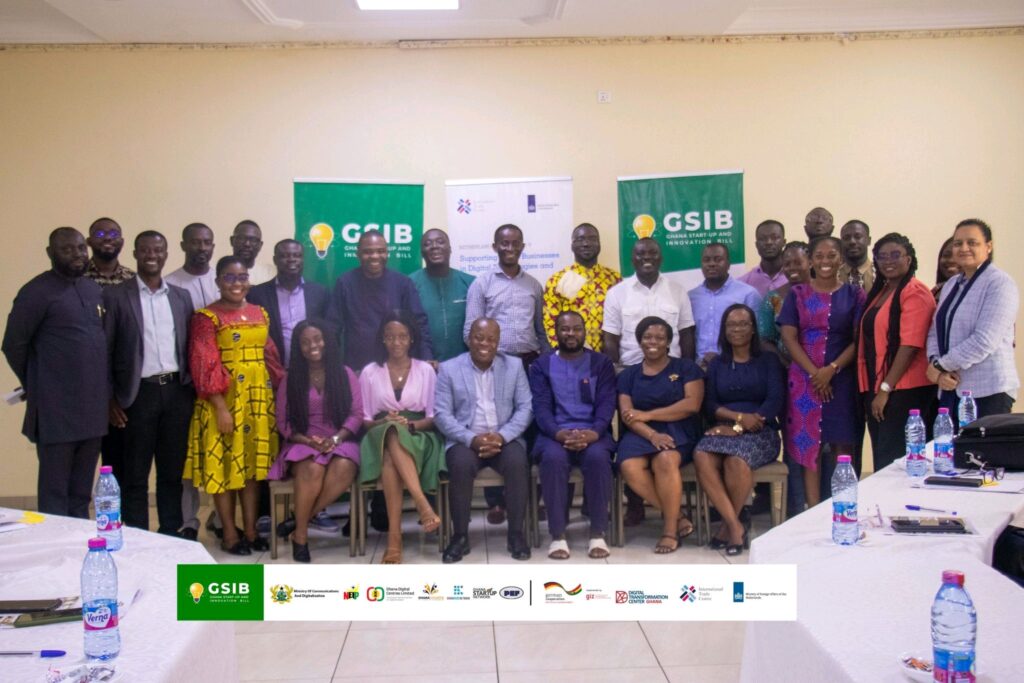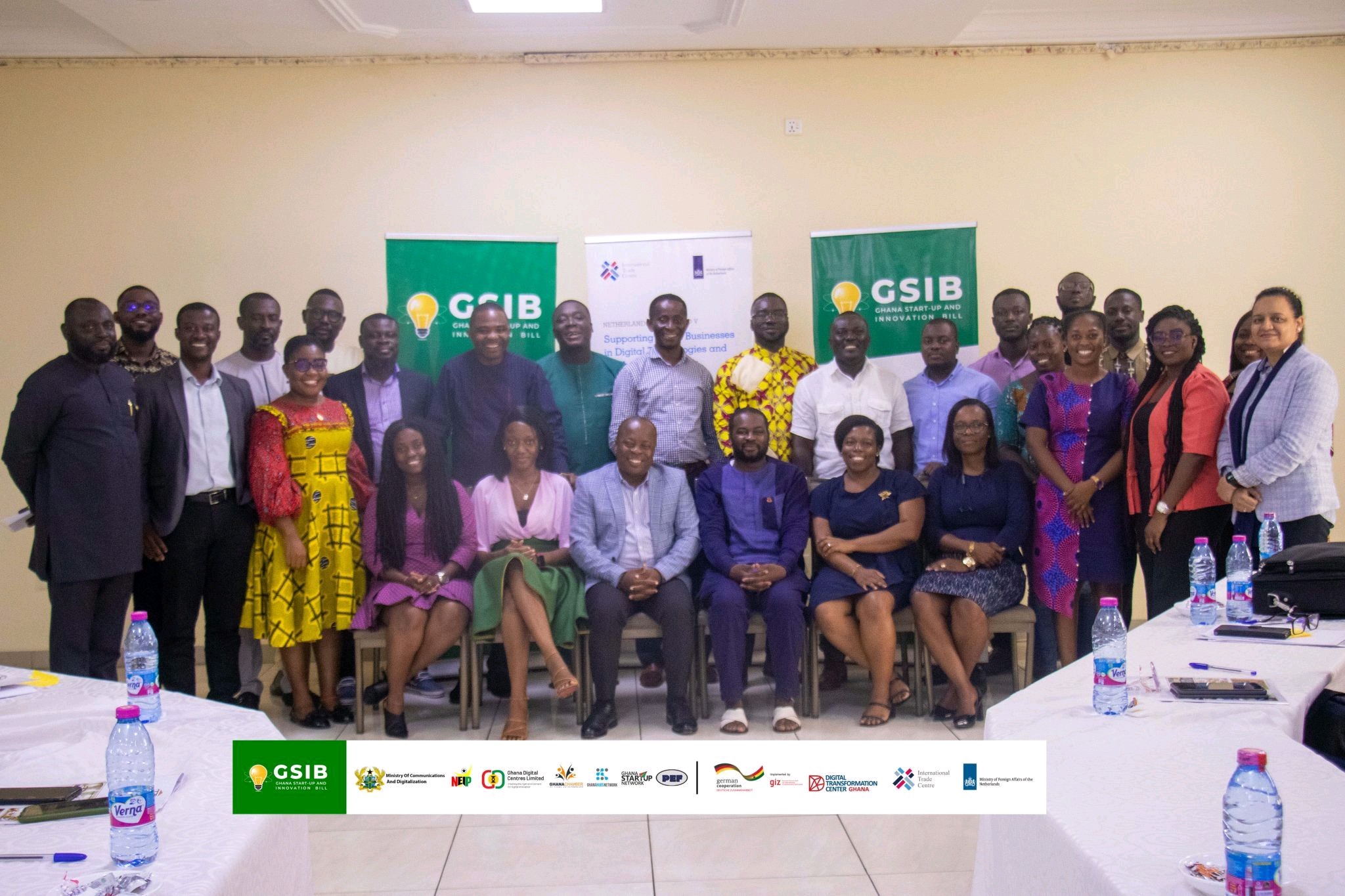Startups in Ghana struggle with access to technical support services, sustainable market linkages and funding to keep them afloat in the initial difficult years. Without an enabling environment created by policy, startups in Ghana are not able to grow an create jobs as expected. Hence, as a member of the research and policy team of the Ghana Startup and Innovation Bill Technical Committee, work is underway with partners to leverage policy to address the challenges of startups in Ghana and create new opportunities to grow the economy.
It is important to note that the need for the policy is as a result of Ghana emerging as one of the most robust and developed startup ecosystems on the continent, following Egypt, Kenya, Nigeria and South Africa as the major hubs on the continent.
Background
In 2019, the Ghana Hubs Network (GHN) embarked on a nationwide policy hackathon with funding support from GIZ Make IT and Konrad Adenauer Stifftung (KAS), two German government organizations promoting entrepreneurship and innovation. As an ecosystem support organization, GHN serves as an umbrella organization for over sixty innovation hubs with a presence in all sixteen regions of Ghana. During the policy engagements, GHN and partners gathered insights into the challenges that entrepreneurs and innovators encounter across the country ranging from policy incoherence, limited funding, high taxes and limited opportunities for skills development. The compiled report from the policy engagements, dubbed hackathons, served as a key engagement tool for partners in formulating a draft Bill in support of startups and innovation in Ghana.
Ghana’s Startup Bill drafting process started in October 2020 with the establishment of a Technical Working Committee (TWC), comprising various private sector companies, government, and CSO representatives. In order to ensure that a cross section of stakeholders was involved, broad consultations were done to ensure the provision of the needed feedback. This then led to the drafting process of the Bill. Other forms of consultation have been completed, including regional consultative workshops, stakeholder dialogues, conferences, and policy engagements with stakeholders, beginning in 2019. The consultative processes also involve the active engagement of researchers, policy analysts, economists, entrepreneurs, legal experts, and members of Parliament to ensure that the Bill, when passed into an Act, will serve the objectives set forth.

The Ghanaian Startup and Innovation Bill project is a joint initiative by Ghana’s private and public sector represented by the Ghana Hubs Network (GHN), Private Enterprise Federation (PEF), Ghana Chamber of Young Entrepreneurs (GCYE), the National Entrepreneurship and Innovation Programme (NEIP), and i4policy. Partners are working together to create the enabling environment for young entrepreneurs to develop ideas into products and services through startups that ultimately support the process of creating badly needed jobs in the Ghanaian economy. The development of the Ghanaian ecosystem also supports efforts at trading startup products and services through the African Continental Free Trade Area (AfCFTA) creating access to bigger continental markets for entrepreneurs.
The Bill, when passed by Parliament and the President of Ghana, will establish various principles and support legislation required to promote startup development and innovation in Ghana. Subsequently, the bill is expected to create an enabling environment for startups’ growth and investment protection. Entrepreneurs and innovators will then be able to commit time and resources to develop sound ideas, solutions and products needed to propel local level growth.
The Policy Rationale
In the 2022 Spark Ecosystem Innovation in Ghana, the country attracted over USD $200m worth of investments for startups. Ghana’s growing environment for supportive programming and continuous economic growth presents several strengths such as significant consumer and business markets, sophisticated entrepreneurial talents, a strong corporate sector, access to local capital and ties to a growing number of international investors. Nevertheless, challenges remain as few startups continue to dominate the startup ecosystem in terms of access to technical support, markets, and funding. This situation limits the potential of other startups in accessing similar opportunities necessitating the need for the Startup and Innovation Bill to ensure the equitable distribution of benefits and ensure startups contribute to creating products, services, and jobs.
According to Venture Capital Africa (VC4A), 71% of Ghanaian ventures are creating jobs with an average of 8.04 FTE per venture. VC4A adds that this rise in ventures is helping create employment for young people, 35 years and below. This is a considerable contribution to the country – youth unemployment is a major issue for Ghana both economically and at the ballot box – that justifies the demand for further investment in the growth and development of the startup ecosystem and the entrepreneurs that drive it.
It is envisaged that the Bill, when passed, will provide a framework for the creation and development of startups in Ghana. Further, the Government of Ghana will then have the needed legal regime within which to allocate incentives and support efforts aimed at strengthening startup development in the country. This is expected to boost or enhance creativity, innovation and the use of new technologies in achieving value addition and increased competitiveness at the national, regional and district levels.
Startup Bills Elsewhere on the Continent
There are many success stories of startup policy development on the continent. The passage of similar Startup Acts in Tunisia, Senegal and Nigeria between 2018 and 2022, have paved the way for multiple startup policies on the continent. For instance, Rwanda, Kenya, Ethiopia and Uganda are making strides in their own startup policy development processes.
Ghana, for its part, is in the advanced stages of getting a policy passed into an Act to improve the enabling environment for startups and investors. Unemployment remains a challenge on the African continent, as a result, any attempt to create an enabling environment for startups to innovate and create jobs is seen as favourable by various stakeholders.
Interestingly, I have observed that startup development on the continent has similarities in objectives. These include the creation of an enabling environment for young people to innovate, create value products and services, create jobs, solve development challenges, and, ultimately, lead to socio-economic development.
Ultimately, partners to the Ghana Startup and Innovation Bill are eager to follow in the footsteps of the countries that have made strides in establishing a Startup Act. The Act is a prerequisite to the creation of jobs and building resilience for startups in Ghana. In addition, the approach of Ghana adopting co-creation and wider consultative process across the country is worthy of emulating. This is because, the wider consultations have proven a useful format in gaining insights and feedback on how to make the process a people’s movement toward gaining traction and the social capital to ensure the policy is implemented fully once it is passed by parliament. These consultations have included community leaders, traders, young entrepreneurs, policy makers, government agencies, corporate institutions, women groups, youth groups, innovators incubation, accelerator hub leaders, researchers, business development experts, and parliamentarians. Each have reviewed, provided insights, and supported the bill’s development in diverse ways. These diverse groups are expected to support the implementation processes once the bill comes into effect, with its structures and the resources to be provided.
Way Forward
As the lead in research and policy, I am tasked with the engagement of experts and professionals from law, economics, media, research, trade policy, innovation and entrepreneurship to review the Bill, and provide the necessary insights needed in the lead up to submitting to Parliament for further assessment and passage into law.
Moreover, with the coming on stream of the African Continental Free Trade Area (AfCFTA) – with its secretariat in Accra – Ghana offers a lot of opportunities for young people to trade products and services within a wider market. This solves a key startup challenge of limited sustainable markets for products and services. By creating the enabling environment to provide technical support services and funding through the startup bill, a holistic process of addressing barriers to startup development in Ghana will be achieved.










